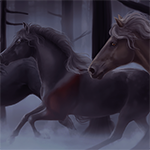02-28-2017, 12:55 AM
AN INNER WHINE LIKE A MAD MACHINE
They were born on the Mountain, separated by short, hot, heavy moments of grunting and animal urge. He was the second to be labored over and when he finally came, he was beautiful—except, it seemed, the brotherly rivalry had begun whilst still tucked together inside their mother’s scarred body. He was smaller than his brother, bonier by a fraction, as if the two had disputed every last morsel of nourishment Sinew had offered them.
And he had lost every bout.
Mother named the first boy Feast, and he was hearty and horned, his split toes must have made the Mountain feel like home—he was half of what their father had fought for, that fat and well-fed goat-boy. The second she named Famine, and when his mother cleared the sac from his face, his tiny mouth yawned open to reveal needle-sharp fangs—he smelled faintly of raw meat and the open wounds that shined on his golden body glistened like little red lakes.
Famine took his first meal on the Mountain, too, alongside his brother. Mother’s milk and some blood he could not help but draw from her; mother gave them everything, the boys were spoiled. They played and nursed and slept, curled up, on that peak, breathing the hard, unforgiving air and feeling, constantly, as if they were overstaying their welcome.
The blight that festered in his body was insatiable. Everyday, a new bone was welcomed by the sloughing, golden skin, smiling through great holes on his hip, shoulder and crest. The edges became green-grey and slimy; his black eyes sunk deep into his skull, the skin around them darkening severely—still, mother loved him.
When the day came, as it always had to (no matter how content they were to stay), mother lead them down the Mountain’s side and when they reached its mammoth feet, a prickling and dangerous sensation washed over the boy’s skin. His ears flung back against his neck and he sidled close to mother, clenching his eyes shut. The blight screamed and complained, filled his ears with such horrible animus, as it receded into his body to live like a caged and angry monster.
His skin mended itself, smooth and clean and he smelled just like a boy—horsehair and dirt.
***
The boy is surely dying—father thinks so.
‘Could have left this one, he does not look like he will make it,’
Everyday, it feels more and more true, as the blight eats away at his stomach and lungs, turning the pink, perfect organs there green and slimey. What it could not do to his outside, it does to his guts mercilessly. Feast leaves him behind more often than not, unencumbered and full of verve. Famine cannot blame him for it. If he can, he tries to keep up and watches Feast with dark, filmy eyes as he feeds scavengers tasty little critters.
He walks with a stilted, wobbly gait, his ears drooping to either side. His head is bony and thin, the contrast between his jutting jawline and sunken eyes is disquieting; those eyes, which sit like extinct stars, flat and black. From his right shoulder sprouts his wing, almost long enough drag in the dust like his father’s. He stalks the wasteland like something reanimated, his knees dirty and scabbed—he winds past the river’s gurgle, keeping clear of its muddy suck because he knows he hasn’t the muscle to pull himself out, and slips into a sandstone cave he had followed his father into one day.
The walls are smooth and strange, as if carved by a drunken craftsman; here and there are chalky marks left by his father’s great horns. He plods over to one, measuring his height against it. He falls short but the disappointment he should feel is regressed by his worried mind—that tireless worker who shelves all the things that are not survival. Famine blinks and grunts, turning away from the wall and that defeat.
He likes the quiet here and the coolness, and in the relative safety, he allows himself to drop, slowly, to his knees, groaning and creaking, and then to his belly; his nose falls to the dusty ground, gravity pulling hard on his atrophied neck.
The boy is surely dying.

